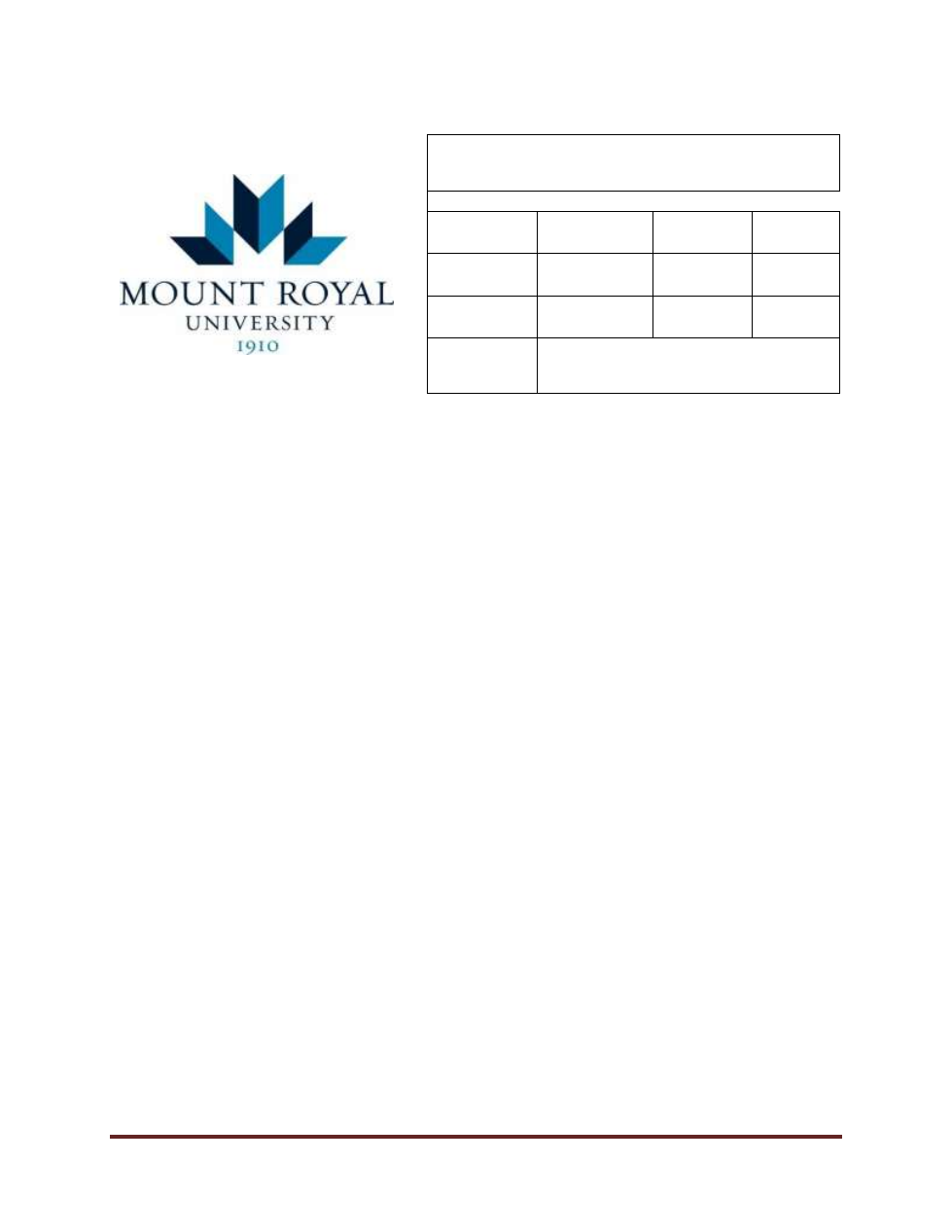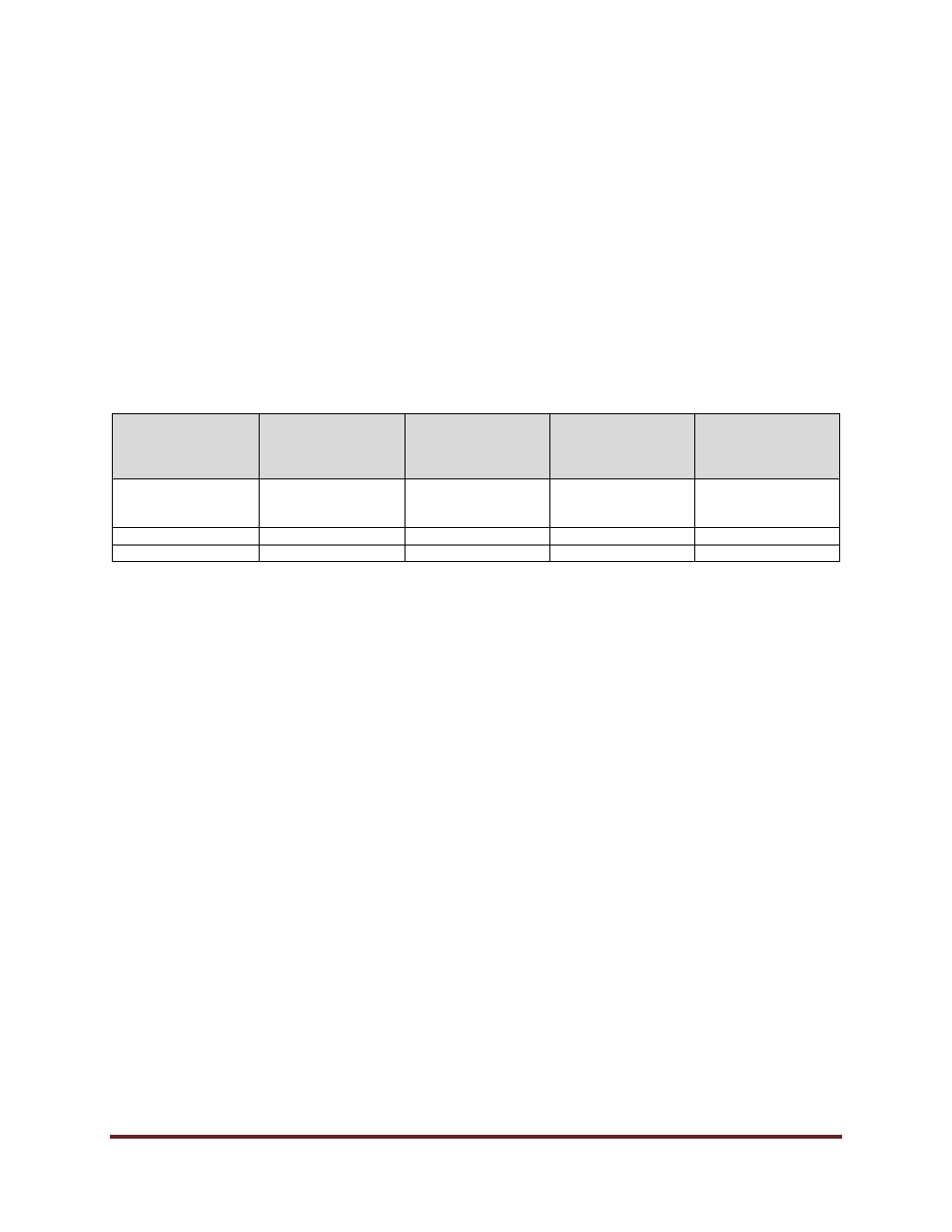
Academic Program Review Procedures – January 19, 2024
Page 1 of 9
ACADEMIC
PROGRAM
REVIEW
PROCEDURES
Procedure
Type:
Academic
Initially
Approved:
January 19,
2024
Procedure
Sponsor:
Provost & VP,
Academic
Last Revised:
Primary
Contact:
Provost & VP,
Academic
Review
Scheduled:
January 19,
2029
Approver:
General Faculties Council
A.
SCOPE
This Procedure applies to Ministry-approved baccalaureate degree, diploma, and certificate
programs at Mount Royal University (University) and excludes those offered by the Faculty of
Continuing Education and Extension.
This procedure applies to those programs that are considered interdisciplinary and multidisciplinary
collaboratively delivered programs and those delivered on campus, online or at other physical
locations. For the purpose of this Procedure, individual majors are considered distinct programs.
B.
PROCEDURES
1.
INITIATION AND PREPARATION
1.1
Initiation
The Provost and VP, Academic will initiate the review by sending a letter to the Dean
of the Faculty.
1.2
Formation of a Self-Study Team
a. The Dean, in consultation with the Chair, will appoint a Lead for the Self Study
Team. The Self Study Team Lead will normally be the Chair or the discipline
Coordinator.
b. The Dean and Self Study Team Lead will select the Self Study Team. The
composition of the Team will be as described in 2.2.1.
1.3
Orientation Workshop
The Academic Quality Assurance Coordinator will meet with the approved Self Study
Team and the Dean (optionally), or designate, to provide an overview of the process
and timelines and identify any special circumstances or conditions that need to be
addressed during the review (e.g., coordination with a professional
accreditation/certification process of the need to address particular identified issues
regarding the program).

Academic Program Review Procedures – January 19, 2024
Page 2 of 9
1.4
Identification of Potential External Reviewers
a. The Self Study Team will submit a list of six or more potential external reviewers
with academic credentials, academic appointment(s), along with a rationale to
the Dean for approval. Once approved by the Dean, the Self Study Team Lead
will provide the list to the Academic Quality Assurance Coordinator (for
feedback) and Dean and Provost and VP, Academic, or designate (for
institutional approval). The Self Study Team should not contact the potential
reviewers until approved by the Provost and VP, Academic, or designate.
b. The external reviewers should be associate or full professors who are
established scholars in the field or discipline and who have experience in
program development and/or administration.
c. The external reviewers must be sufficiently distanced from the program and
department, and have no perceived or real Conflict of Interest with the University.
1.5
Preparation of Guiding Questions
a. The Self Study Team will submit a list of guiding questions to be approved by
the Dean. Once approved by the Dean, the Self Study Team Lead will provide
the questions to the Academic Quality Assurance Coordinator (for feedback) and
Provost and VP, Academic, or designate (for institutional approval).
b. The guiding questions serve to bring focus to the Self Study and are provided to
the external reviewers as part of the Self Study Report.
c. In preparing the guiding questions, Self Study Teams will determine if any
additional data is required to evaluate the academic program under review. The
Office of Institutional Research and Planning will support, as can be reasonably
accommodated, any additional data requirements.
2.
SELF STUDY
2.1
The Self Study Team
a. The Self Study Team will be formed according to the process described in
section 1.1.2.
b. The Self Study Team will normally consist of the following members:
i. The Chair, normally appointed by the Self Study Team Lead;
ii. The discipline/program Coordinator (where applicable);
iii. One or two other internal faculty members from the discipline/program;
and
iv. One faculty member from a different discipline/program within the
University.
c. Upon approval of Provost and VP, Academic, or designate, the Self Study Team
may include additional members, such as a senior student or an academic
advisor (if available).
d. The Dean will approve the Self Study Team selections and communicate the
team member names to the Academic Quality Assurance Coordinator within 30
days of receiving the initiation memo from the Provost and VP, Academic.

Academic Program Review Procedures – January 19, 2024
Page 3 of 9
2.2
Self Study Team Activities
a. Consult with faculty, staff, and administration within the Faculty, as well as
current program students, the Students Division, and other internal
stakeholders.
b. Consult with program alumni, colleagues in similar programs at other
institutions, employers, comparator institutions or programs, institutions
receiving Students post-graduation, Program Advisory Committee members
(where applicable) and any other external stakeholders or resources.
c. Analyze and interpret program data from the provided reports, including the
data package and library report pertaining to the faculty and staff, the student
profile, alignment and achievement of program learning outcomes, student and
graduate surveys, graduate employment and further education, program
sustainability, the library resources and utilization, etc.
d. Conduct an environmental scan of external trends and factors relevant to the
program’s continuing success and quality.
e. Identify industry best practices and developments in the discipline and in similar
programs elsewhere.
f.
Conduct a critical, detailed analysis of the program’s strengths, weaknesses,
opportunities and threats (SWOT analysis).
g. Develop a preliminary program advancement plan for improving the program.
h. Prepare and submit the Self Study Report (see section 2.2.3 below).
2.3
Self Study Report
a. Overview:
i.
The Self Study Report is a concise, yet critically reflective document that
articulates the methods, findings, conclusions and recommendations of
the Self Study Team. The Self Study Report is subject to a 50-page
maximum length, not including the appendix;
ii.
A template for the Self Study Report is available from the Academic
Quality Assurance Coordinator in the Office of Institutional Research and
Planning.
b. Elements Assessed:
i.
Overview of the process undertaken, an examination of previous program
review results and current advancement plan progress (where applicable);
ii.
Program description and viability;
iii.
Students and graduates, including trends in admissions, the student
profile, student experience, success and satisfaction;
iv.
Program quality, curricula, and delivery;
v.
Faculty and Staff, including faculty-to-student ratios, evaluation methods
and professional development resources;
vi.
Research and Scholarship;

Academic Program Review Procedures – January 19, 2024
Page 4 of 9
vii.
Alignment with the University’s mandate, mission and strategic directions;
viii.
Resources (including Library, facilities, and equipment); and
ix.
Reflection (strengths, weaknesses, opportunities and threats) and
planning by way of the program advancement plan.
c. Submission and Approval:
i.
Once the Self Study Report is completed, the Self Study Team Lead will
forward it to the Chair, Associate Dean or Vice Dean, and the Dean,
notifying the Academic Quality Assurance Coordinator. The Self Study
Team Lead will revise as needed after the Deans’ review.
ii.
The Dean will then submit the Report to the Provost and VP, Academic,
or designate, and the Academic Quality Assurance Coordinator, who will
review the Report to ensure it meets expected standards. The Self Study
Team Lead will revise as needed after the Provost and VP, Academic, or
designate, completes their review.
iii.
After revisions and upon final approval of the Self Study Report, the
Provost and VP, Academic, or designate, will authorize the release of the
Self Study Report to the external reviewers.
3.
EXTERNAL REVIEW
3.1
External Review Team
a. The External Review Team will consist of two faculty peers from the discipline,
field or profession who are external to the institution and sufficiently distanced
from the program, department and the University.
b. The External Review Team will be associate or full professors who are
established in their field and who have experience in program development
and/or administration.
c. The External Review Team will be selected by the Provost and VP, Academic,
or designate, in consultation with the Dean.
d. The Dean will invite the approved external reviewers to the site visit. One of the
reviewers will be requested to act as Chair of the External Review Team.
3.2
External Review Team Activities
a. Review the Self Study Report;
b. Conduct interviews with stakeholders, including students, faculty, staff and
administrators during the site visit;
c. Evaluate the overall quality of the program, in terms of the criteria identified in
2.3(b) above;
d. Identify the program’s key strengths, weaknesses, opportunities and threats;
e. Formulate concrete recommendations for improving and advancing the program;
and;
f. Prepare and submit the External Reviewers’ Report (see section 3.5 below)
within 30 days of the site visit.

Academic Program Review Procedures – January 19, 2024
Page 5 of 9
3.3
Briefing Documents
a. In advance of the site visit, the Self Study Team Lead will provide the External
Review Team with the following documents:
i.
Information about the University, its mandate, and the program review
process at the University;
ii.
The Self Study Report and the preliminary program advancement plan,
iii.
The site visit schedule; and
iv.
Any additional information requested in support of the review.
b. In advance of the site visit, the Self Study Team Lead will provide a briefing note
for all University employees involved in the site visit interviews with the External
Review Team. This briefing note provides basic information about the program,
summarizes the main findings of the program review, and outlines the intended
next steps for advancing the program.
3.4
Site Visit
a. The site visit will be arranged by the Self Study Team Lead and their
administrative support, or with the support from the Dean’s office.
b. During the site visit, the External Review Team will have access to the program’s
academic administrators, faculty, staff and Students, academic service
department administrators and others, as deemed appropriate. The site visit
must be scheduled to ensure consultation with Students in the program.
c. At the completion of the site visit, the External Review Team will provide an initial
verbal debriefing of their key findings at a meeting with the Provost and VP,
Academic, Vice-Provost Academic, the Dean, Associate or Vice-Dean
Academic, the Self Study Team Lead, the Academic Quality Assurance
Coordinator, and any other identified key individuals.
3.5
External Reviewers’ Report
a. The External Reviewers’ Report documents the methods, findings, conclusions,
and recommendations of the External Review Team.
b. The External Reviewers’ Report should, at minimum, address the following
considerations:
i.
How the program’s overall quality compares to expected standards and
similar programs elsewhere;
ii.
Whether the program provides appropriate academic depth and breadth
relative to expected standards and similar programs elsewhere;
iii.
Whether the program demonstrates an understanding of the needs of
learners in the program and provides for a high-quality student experience
with appropriate learner supports;
iv.
Whether the program has the academic faculty expertise to deliver the
program curriculum, sufficient number of qualified faculty, and does the
faculty demonstrate a level of scholarly activity appropriate for academic
staff teaching in a baccalaureate degree, diploma, or certificate program
(as appropriate);

Academic Program Review Procedures – January 19, 2024
Page 6 of 9
v.
Whether the institution and/or program has the academic resources (e.g.,
supporting disciplines, library resources) and infrastructure (e.g.,
classrooms, labs, offices, equipment) to sustain the program and maintain
program quality (provide Assessment Standards for external reviewers, as
apocopate);
vi.
What are the program’s key strengths, weaknesses, opportunities and
threats based on the review of the Self Study Report and consultation with
key stakeholders; and
vii.
Recommendations for improving the quality and viability of the program
going forward.
c. The External Review Team will present a single joint report based on consensus.
d. Within 30 days of the site visit, the External Review Team will submit their report
to the Dean, or designate.
e. The Dean will circulate the External Reviewers’ Report to the Self Study Team,
Chair, the Academic Quality Assurance Coordinator, and other program Faculty
and staff.
4.
RESPONSE TO EXTERNAL REVIEWERS’ REPORT AND REVISION OF
ADVANCEMENT PLAN
4.1
Within 60 days of receiving the External Reviewers’ Report, the Self Study Team will
prepare a written response and submit it to the Dean. The response will include:
a. Clarifications or corrections to the content of the Self Study Report;
b. A response or comment addressing all recommendations in the External
Reviewers’ Report; and
c. A finalized program advancement plan. The original preliminary program
advancement plan remains intact and a new document, representing the
finalized program advancement plan is created in response to the
recommendations made in the External Reviewers’ Report, in consultation with
the Dean.
4.2
The Dean may accept the response as submitted, or refer it back to the Self Study
Team for further consideration.
5.
FINAL APPROVAL OF PROGRAM REVIEW AND ADVANCEMENT PLAN
5.1
The Dean will forward the following documentation to the Provost and VP, Academic,
or designate:
a. A signed Executive Summary, prepared by the Dean, of program review findings
and recommendations from the Self Study Report, External Reviewers’ Report,
and Response to the External Reviewers’ Report;
b. The Self Study Report, including all appendices;
c. The External Reviewers’ Report;
d. The rationale for choosing the External Reviewers, including names, academic
appointment(s), and credentials of the reviewers;
e. Itinerary for the site visit;

Academic Program Review Procedures – January 19, 2024
Page 7 of 9
f. External Reviewers’ CVs;
g. The Response to the External Reviewers’ Report; and
h. The finalized program advancement plan:
i. Including a proposed detailed timeline for implementing improvements and
changes; and
ii. The Dean’s recommendations on how to implement any planned changes
requiring new funding or resources. Implementation of such changes may
be identified as conditional upon securing of new funding or resources (e.g.,
through the regular budget process or other means).
5.2
The Provost and VP, Academic, or designate, will review the documentation
provided, consult with the Dean and Self Study Team Lead, as necessary, to address
any outstanding issues, and forward the review package, as outlined above in 5.1,
to the Academic Standards Committee (ASC), a standing committee of the General
Faculties Council, for final approval.
6.
COMMUNICATION
6.1
Upon final approval, the results of the review will be communicated as follows:
a. The Dean’s Executive Summary and the finalized program advancement plan
will be presented to the General Faculties Council for information and posted on
the Quality Assurance website;
b. Distribution of the program review documents will be submitted to any other
regulatory body on an as needed basis.
6.2
The Academic Standards Committee will receive a mid-cycle update on the
advancement plan implementation.
7.
IMPLEMENTATION OF ADVANCEMENT PLAN
7.1
The Chair and Dean will be responsible for implementing the program advancement
plan as per the timelines indicated in the plan.
7.2
In implementing the program advancement plan, the Chair and Dean may draw upon
available institutional resources, as needed.
7.3
Any curricular changes identified in the plan will be submitted for implementation
through the University’s process outlined in the Curriculum Approval Policy for
Ministry-Approved Programs.
8.
MONITORING OF ADVANCEMENT PLAN IMPLEMENTATION
Annually the Chair will submit a report detailing progress made in implementing the program
advancement plan to the Dean. The Provost and VP, Academic, or designate, will engage
with the Dean on an as needed basis for the status of the advancement plan implementation.
9.
REVIEW OF INTERDISCIPLINARY OR MULTIDISCIPLINARY PROGRAMS
9.1
The review of interdisciplinary and multidisciplinary programs will follow the same
general procedure outlined above.

Academic Program Review Procedures – January 19, 2024
Page 8 of 9
9.2
Prior to initiation of such a review, the Provost of VP, Academic, or designate, will
meet with the relevant Dean(s) to:
a. Determine the composition of the Self study Team to ensure input from the
different core disciplines involved in delivering the program; and
b. Determine the role each Dean will play in the review process (if multiple Deans
are involved in administering the program).
C.
DEFINITIONS
(1)
Academic
Standards:
The Canadian Degree Qualifications Framework and the Campus
Alberta Quality Council, both of which specify the academic
standards for degree programs.
(2)
Conflict of
Interest:
Arises when individuals are placed in a position whereby their
personal interest conflicts with the best interests of Mount Royal
University. The test of a Conflict of Interest is not just a case of
whether the individual is actually improperly influenced by their
personal interest, obligation or objective but the pivotal issue is
whether circumstances lend themselves to such a possibility.
(3)
Faculty
Member:
A personal responsible for an academic or scholarly activity and can
include course instructor, faculty member, practicum coordinator,
work integrated supervisor, research associate, and other.
(4)
Policy:
Means the Academic Program Review Policy.
(5)
Procedures: Means the Academic Program Review Procedures.
(6)
Student:
Means an individual who maintains an affiliation as a leaner in the
University’s educational community.
(7)
Report:
Means the Self Study Report.
(8)
Research:
Research is an undertaking intended to extend knowledge through
a disciplined inquiry and/or systematic investigation as defined in the
Tri-Agency Framework: Responsible Conduct of Research (2021).
Research also includes activities related to one or more of scholarly
or artistic work which occurs through discovery, integration, teaching
and learning, or application of knowledge and is usually
disseminated through peer-reviewed processes.
(9)
University:
Means Mount Royal University.
D.
RELATED POLICIES
●
Academic Program Quality Assurance Policy
●
Academic Program Review Policy

Academic Program Review Procedures – January 19, 2024
Page 9 of 9
E.
RELATED LEGISLATION
●
Alberta Post-Secondary Learning Act
F.
RELATED DOCUMENTS
●
Campus Alberta Quality Council Guidelines for Degree Program Quality Monitoring
●
Campus Degree Qualifications Framework
●
Self Study Report Template
●
Universities Canada Principles of Quality Assurance in Canadian Higher Education
G.
REVISION HISTORY
Date
(mm/dd/yyyy)
Description of
Change
Sections
Person who
Entered Revision
(Position Title)
Person who
Authorized
Revision
(Position Title)
1/19/2024
NEW
(replacing Cyclical
Review of Academic
Programs Policy)
General Faculties
Council








